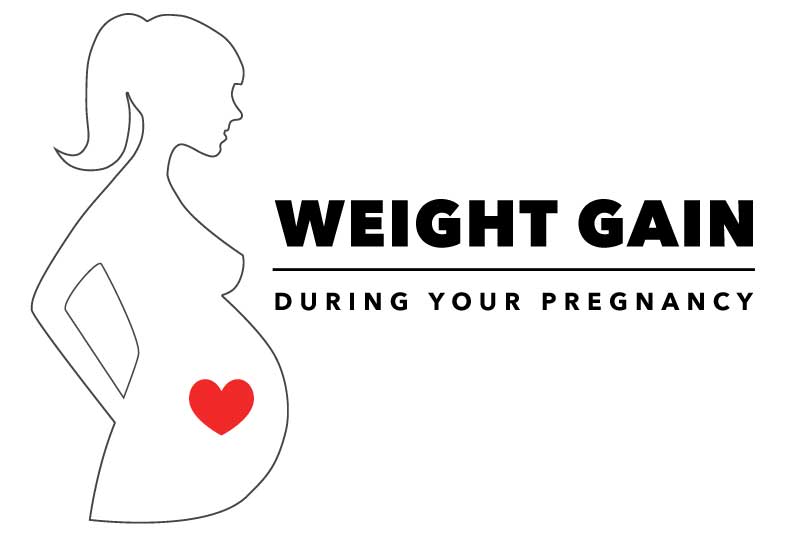Is how much weight you gain during pregnancy important?
Yes! A healthy weight gain during pregnancy will help you avoid pregnancy complications such as gestational diabetes, preeclampsia, and cesarean delivery.
Determining how much weight to safely gain during pregnancy depends on your pre-pregnancy Body Mass Index (BMI). BMI is a numerical value of your weight in relation to your height. It’s used to determine if an adult is at a healthy weight.
The Centers for Disease Control offers a BMI calculator. Check yours so you know you’re starting point.
| Pre-pregnancy weight | Recommended weight gain |
|---|---|
| Source: Institute of Medicine and National Research Council | |
| Underweight (BMI under 18.5) | 28 to 40 lbs. (about 13 to 18 kg) |
| Normal weight (BMI 18.5 to 24.9) | 25 to 35 lbs. (about 11 to 16 kg) |
| Overweight (BMI 25 to 29.9) | 15 to 25 lbs. (about 7 to 11 kg) |
| Obesity (BMI 30 or more) | 11 to 20 lbs. (about 5 to 9 kg) |
Your health and your baby’s health also play a role. Talk with your healthcare provider about what weight gain is right for your pregnancy.
Where does pregnancy weight go?
Your baby might weigh in at 7 or 8 pounds (about 3 to 3.6 kilograms). That accounts for some of your pregnancy weight gain. What about the rest? Here’s a sample breakdown:
- Larger breasts: 1 to 3 pounds (about 0.5 to 1.4 kilogram)
- Larger uterus: 2 pounds (about 0.9 kilogram)
- Placenta: 1 1/2 pounds (about 0.7 kilogram)
- Amniotic fluid: 2 pounds (about 0.9 kilogram)
- Increased blood volume: 3 to 4 pounds (about 1.4 to 1.8 kilograms)
- Increased fluid volume: 2 to 3 pounds (about 0.9 to 1.4 kilograms)
- Fat stores: 6 to 8 pounds (about 2.7 to 3.6 kilograms)
Putting on pounds during pregnancy
A pregnant woman of normal weight, who gets less than 30 minutes of exercise a week should strive for a caloric intake of:
- 1,800 during the first trimester
- 2,200 during the second trimester
- 2,400 during the third trimester
These calories should be attained by eating a diet of grains, dairy, protein, fruits/vegetables, and healthy fats and oils.
Limiting processed foods, sugars and extra fats can help you attain your goals.
Average Pregnancy Weight Gain Chart
- 7 1/2 pounds is about how much the baby will weigh by the end of pregnancy.
- 1 1/2 pounds is how much the placenta weighs.
- 4 pounds is attributed to increased fluid volume.
- 2 pounds is the weight of the uterus.
- 2 pounds is the weight of breast tissue.
- 4 pounds is because of increased blood volume.
- 7 pounds is attributed to maternal stores of fat, protein, and other nutrients.
- 2 pounds for the amniotic fluid.
- Total: 30 pounds
On a trimester basis in a woman with normal pre-pregnancy weight:
- First trimester: 1-4.5 pounds
- Second trimester: 1-2 pounds per week
- Third trimester: 1-2 pounds per week
Remember this is just an average; you and your health care provider need to decide what is best for you.
Want to Know More?
Compiled using information from the following sources:
American Congress of Obstetricians and Gynecologists
Institute Of Medicine, Report Brief May 2009, Weight Gain during Pregnancy: Reexamining the Guideline
Mayo Clinic: Pregnancy Weight Gain
Institute of Medicine and National Research Council






